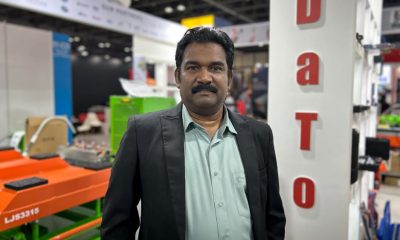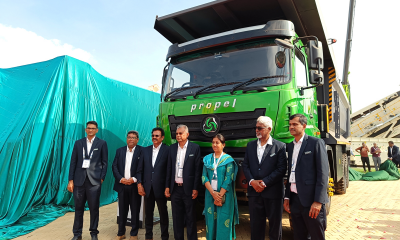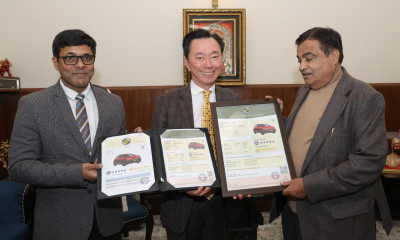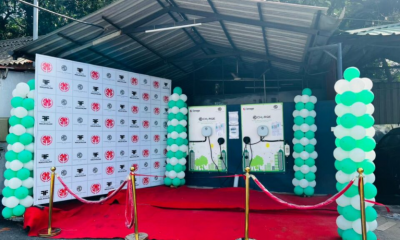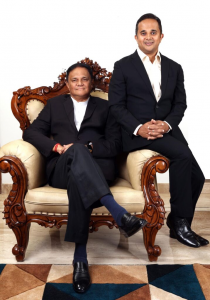
In this wide-ranging conversation with N. Balasubramanian, G. S. Ramesh, Chairman of Layam Group, shares the remarkable journey of a purpose-led organisation that is changing lives and shaping the future of India’s industrial workforce. With a powerful vision rooted in nation-building, inclusivity, and human development, Mr. Ramesh outlines how Layam has grown from a values-driven start-up to a top-tier workforce partner to leading OEMs and industries across the country.
A Mission Sparked by Purpose
After a successful corporate stint with Hyundai and other multinationals, Mr. Ramesh took a decisive step in 2007 to pursue his deeper calling. “The entrepreneurial mind was always troubling me. I wanted to leave something meaningful behind, something with a soul,” he recalls. Motivated by the belief that India had enough talent and values to build its own global-class consulting and workforce solution brand, he launched Layam Group—with an Indian name, Indian ethos, and a deeply personal sense of purpose.
The name ‘Layam’ itself is spiritual in origin, received during meditation. “Layam stands for rhythm and harmony. It’s about offering solutions with balance and peace. It’s not just a company—it’s an idea, a movement,” he explains.
From Skilling Dropouts to Building a Talent Pipeline
One of Layam’s core missions has been to identify and uplift the untapped workforce—youth from small towns and rural regions who had either dropped out of diploma courses or lacked soft skills but possessed raw technical ability.
“In my time at Hyundai, I deliberately avoided picking from the top layer. I selected second- and third-tier candidates, often children of masons and labourers, and gave them a platform. I carried the same model into Layam,” Mr. Ramesh says.
Layam’s innovative approach placed these youth as Operative Trainees within industrial setups, giving them hands-on experience and skilling opportunities. “Before the government’s skilling programmes even came into existence, we had already started this mission in 2007,” he adds.
Today, Layam works with over 15,000 individuals on its rolls, covering everything from staffing and job contracts to skill training, R&D, and contract manufacturing. Their unique model covers full-time and contract employment, with every candidate on statutory payroll with PF and ESI coverage.
Strategic Expansion into Automotive and Telecom
With approximately 60% of its business in the automotive sector, Layam is a trusted partner to marquee OEMs like Tata Motors, Ashok Leyland, Mahindra, and global component players such as Yazaki. “We are present across all Yazaki plants pan-India,” says Mr. Ramesh.
The company has also diversified into telecom, seeing it as a high-growth sector with opportunities to upskill and employ women, especially in Tier-2 regions like Chengalpattu and beyond. “We are working on creating inclusive employment. Precision, patience, and hand skills make women ideal for telecom and wiring harness roles,” he explains.
Layam also supports electric vehicle production across Tata Motors’ EV plants and is active in validation and testing services for Mahindra’s vehicle platforms.
From Headcount to Brain Count: Preparing for EV & AI Ecosystems
Mr. Ramesh is acutely aware of the transformation sweeping through the industrial landscape, particularly with the rise of electric mobility and AI. He believes the key is to move from “headcount to brain count”—customising talent to meet the evolving needs of industry.
“India has to adapt, not just adopt. EV is the future, but you need people ready for it—skilled in both tech and behaviour. Same with AI—it’s a tool, not a master. We must be careful not to become slaves to it,” he asserts.
Layam is integrating AI and digital tools to train and manage its workforce, offering smartphone-based skilling solutions and app-based monitoring systems. However, he warns against superficial tech adoption. “You can’t just throw buzzwords around. Implementation and sustainable execution are critical. Every change must be backed by a mindset shift and skilling initiative,” he emphasises.
Investing in Dignity: The Human Side of Workforce Strategy
Throughout the conversation, Mr. Ramesh continually returns to one theme—dignity of labour. Layam’s systems are built to ensure that every individual, whether a driver, technician, or quality inspector, is treated with respect.
He shares the story of a dropout who was selling SIM cards in Kauai and is today heading a 650-member team under Layam, earning over ₹80,000 a month. “Their kids are in English-medium schools now. The social status of the entire family has changed,” he reflects with quiet pride.
Another example stands out—a worker who died in a road accident was repatriated by Layam to his remote village in Arunachal Pradesh, with full support extended to the family. “People asked why I was doing it. I said, these are my boys. I’m responsible for them,” he says.
Addressing the Driver Shortage – A Potential New Frontier
Acknowledging the country’s dire need for skilled drivers, Mr. Ramesh is exploring ways to contribute to the cause. “Driving is not seen as a profession yet—it’s often hereditary or accidental. We need to institutionalise training and give it dignity,” he notes.
Layam has already employed around 500 drivers for Mahindra and is considering overseas deployment, including a request for 400 drivers from Dubai. “But unless the hygiene factors are in place—housing, insurance, working conditions—I don’t take it up. Human wellbeing is non-negotiable,” he asserts.
Partnering with Government for Scalable Impact
Layam is actively working with the Government of India’s skilling programmes like Skill India, NAPS, and the newly launched NAT. “Tamil Nadu has been especially progressive in this area. Our collaborations with ASGC and other agencies have helped train and deploy thousands,” says Mr. Ramesh.
The company’s R&D centres and Centres of Excellence with clients like Tata Motors and Ashok Leyland further reinforce its role as a talent development partner, not just a staffing provider.
Building an Institution, Not Just a Business
While Layam today figures among the top ten players in India’s staffing sector, Mr. Ramesh is clear that his legacy must go beyond turnover and rankings.
“My dream is to build Layam into an institution of power, intellect, and qualitative value addition. Commercial success will follow—don’t chase money, let money chase you,” he says. With his son now taking over the reins, the vision is to ensure Layam remains a company of choice, rooted in integrity and innovation.




